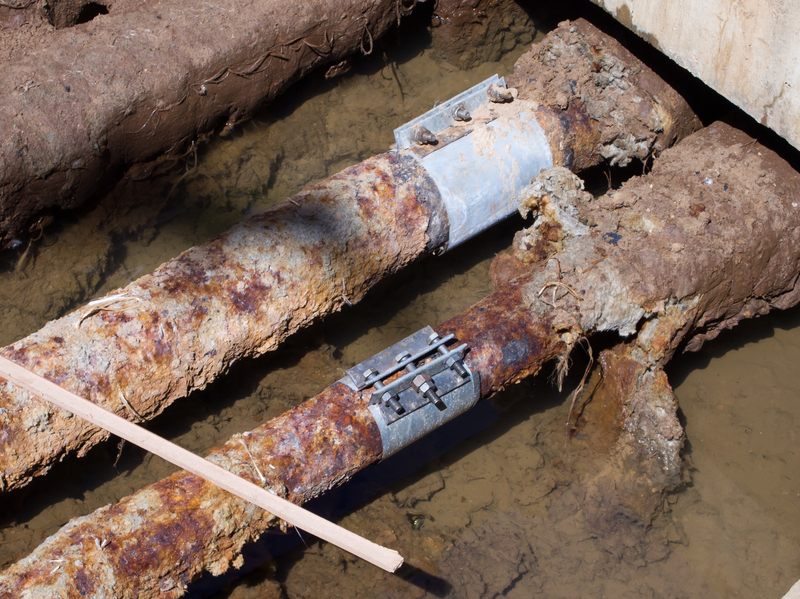Mississippi Materials and Ethics 15 PDH Discount Package 1
Courses in this Package
Corrosion: Overview (H04-001)
Engineering Ethics for Mississippi Professional Engineers (MS2-001)
Pre-Coating Surface Preparation (T02-003)
Structures and Properties of Metals (T07-001)

This online engineering PDH course provides basic information on the chemical interaction taking place during the corrosion process between the environment and the corroding metal. It also describes preventive measure to minimize or control the corrosion process.
Uncontrolled corrosion can cause many serious problems. Corrosion occurs continuously, and every metal in every facility is subject to some type of corrosion. Even though corrosion cannot be eliminated, it can be controlled.
This 4 PDH online course is applicable to chemical and environmental engineers, design and construction personnel, technical staff and facility operators who are interested in gaining a better understanding of the theory of corrosion.
This PE continuing education course is intended to provide you with the following specific knowledge and skills:
- Corrosion theory
- General corrosion
- Crud and galvanic corrosion
- Specialized corrosion
In this professional engineering CEU course, you need to review Module 2, "Corrosion" of the Department of Energy Publication DOE-HDBK-1015/1-93, "Chemistry".
Upon successful completion of the quiz, print your Certificate of Completion instantly. (Note: if you are paying by check or money order, you will be able to print it after we receive your payment.) For your convenience, we will also email it to you. Please note that you can log in to your account at any time to access and print your Certificate of Completion.

This online engineering PDH course presents the laws and rules of professional responsibility governing the practice of engineering in the State of Mississippi through the Mississippi Code: Title 73, Chapter 13, “Professional Engineers and Surveyors” and Title 30, Part 901, “Rules and Regulations of the Mississippi Board of Licensure for Professional Engineers and Surveyors”.
Engineering ethics is (1) the study of moral issues and decisions confronting individuals and organizations involved in engineering and (2) the study of related questions about moral conduct, character, ideals and relationships of peoples and organizations involved in technological development (Martin and Schinzinger, Ethics in Engineering).
Since engineers are faced with frequent moral and ethical dilemmas while practicing their engineering profession, this course will provide you with moral and ethical guidance in your decision making process. Most importantly, it will provide you with insight on how to conduct, respect and protect your engineering practice with the utmost professionalism.
This 2 PDH online course is applicable to Professional Engineers licensed in the State of Mississippi and who are required to demonstrate continuing professional competency in engineering ethics as a condition of their license renewal. For each renewal period, every licensee must complete thirty (30) professional development hours, at least one (1) of which must be relative to the rules of professional responsibility, conduct and ethics. The remaining hours shall relate to the licensee's area of practice.
This PE continuing education course is intended to provide you with the following specific knowledge and skills:
- Understanding the Mississippi laws and rules regulating the practice of engineering in the State of Mississippi and their application to Professional Engineers
- Understanding the rules of professional responsibility, professional conduct and engineering ethics
- Familiarizing with the Mississippi disciplinary process and the various violations and corresponding penalties imposed by the board
In this professional engineering CEU course, you need to review the course document titled “Engineering Ethics for Mississippi Professional Engineers”.
Once you complete your course review, you need to take a multiple-choice quiz consisting of ten (10) questions to earn 2 PDH credits. The quiz will be based on the entire document.
Upon successful completion of the quiz, print your Certificate of Completion instantly. (Note: if you are paying by check or money order, you will be able to print it after we receive your payment.) For your convenience, we will also email it to you. Please note that you can log in to your account at any time to access and print your Certificate of Completion.

This online engineering PDH course describes surface preparation standards, common methods of surface preparation, and abrasive type and selection methods.
Surface preparation is the key factor in determining the success of a protective coating system. The equipment and techniques that can be used to achieve the desired surface cleanliness and roughness (profile) vary considerably. Traditional methods of surface preparation are now accompanied by new, innovative methods that have evolved mainly because of the issues surrounding the safe removal of lead-containing coatings from industrial structures. The ultimate objective of surface preparation is to create proper adhesion of a coating over an underlying substrate.
This 2 PDH online course is applicable to engineers, design and construction personnel, and other technical professionals who are interested in gaining a better understanding of surface preparation prior to coating applications.
This PE continuing education course is intended to provide you with the following specific knowledge and skills:
- Common methods of surface preparation
- Abrasive type and selection
- Surface preparation standards and specifications
In this professional engineering CEU course, you need to review Chapter 7 of the "Painting: New Construction and Maintenance" engineering manual, published by the United States Army of Corps of Engineers (USACE), Publication Number EM 1110-2-3400.
Upon successful completion of the quiz, print your Certificate of Completion instantly. (Note: if you are paying by check or money order, you will be able to print it after we receive your payment.) For your convenience, we will also email it to you. Please note that you can log in to your account at any time to access and print your Certificate of Completion.

The online engineering PDH course addresses two aspects of metals. The first part of this course deals with the basic structures of metals and how those structures are affected by various processes. In addition, it contains information on the various imperfections and defects that the metal may sustain and how they affect the metal. The second part contains information on metal properties which are considered when selecting material for engineering design purposes. Each of these properties contains a discussion on how the property is affected and the metal's application.
This 7 PDH online course is applicable to structural and mechanical engineers, construction and design personnel, technical staff and facility operators who are interested in gaining a better understanding of the structures and properties of metals.
This PE continuing education course is intended to provide you with the following specific knowledge and skills:
- Understanding bonding
- Learning about common lattice types
- Understanding grain structure and boundary
- Learning about polymorphism and alloys
- Knowing the imperfection in metals
- Learning about stress and strain and Young's
- Modulus Understanding stress-strain relationship
- Understanding the physical properties of materials
- Learning about working metals and corrosion
- Understanding hydrogen embrittlement
In this professional engineering CEU course, you need to review Modules 1 and 2, "Structures and Property of Metals" of the Department of Energy Publication DOE-HDBK-1017/1-93, "Material Science".
Upon successful completion of the quiz, print your Certificate of Completion instantly. (Note: if you are paying by check or money order, you will be able to print it after we receive your payment.) For your convenience, we will also email it to you. Please note that you can log in to your account at any time to access and print your Certificate of Completion.